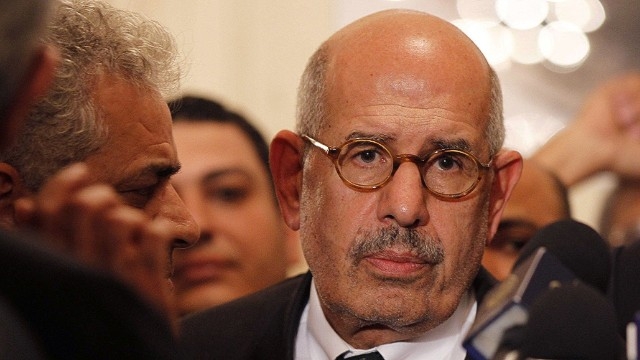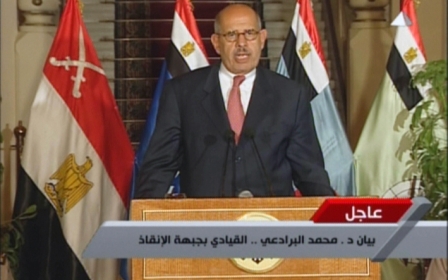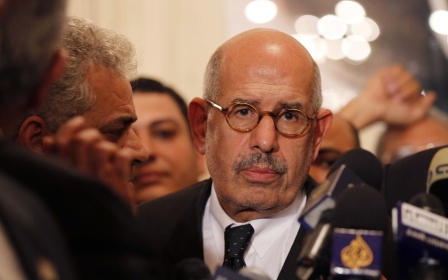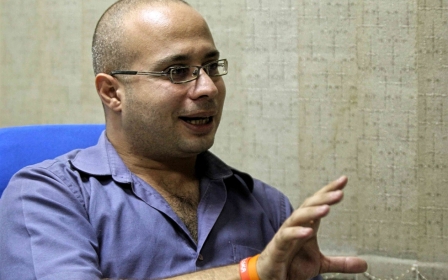Egypt's Baradei faces firestorm after criticising military rule

An exiled Egyptian statesman, Mohamed el-Baradei, is facing calls for his citizenship to be stripped after he implicitly criticised the rule of President Abdel Fattah al-Sisi.
El-Baradei, a former director-general of the International Atomic Energy Agency, served as vice president for a month after the military seized power in a popular-backed coup in July 2013 – he currently lives in self-exile in Austria.
During an interview with the London-based Arabic news channel al-Araby on Saturday, Baradei implicitly criticised the Egyptian president, saying: “A graduate of the armed forces can be a great commander, but he won’t know how to run the Education Ministry.”
“The logical consequence is that authoritarian rule creates extremist groups,” he added.
As head of the armed forces at the time, Sisi led a military coup against Mohamed Morsi, the country’s first democratically elected president, on 3 July 2013.
The episode, aired on Saturday night, was the first of four planned televised interviews with Baradei.
The first was mainly devoted to what Baradei, a veteran diplomat and politician, experienced while serving as an Egyptian delegate to the UN during the 1973 Arab-Israeli war, but also included implied criticism of the military rule in Egypt.
Accusations of 'treason'
In response to the interview, a group of three MPs have called for Baradei's Egyptian citizenship to be withdrawn, accusing him of “treason”.
There have also been moves to strip the exiled statesman of the Order of the Nile, Egypt’s highest state honour, which Baradei was given by then-president Hosni Mubarak in 2006 after winning the Nobel Peace Prize for his work with the IAEA.
Tariq Mahmoud, an Alexandria politician supportive of Sisi, on Monday submitted a legal bid calling for Baradei to be stripped of the honour, accusing him of “plotting with foreign actors to embarrass the Egyptian state”.
Recipients of the Order of the Nile receive a monthly stipend from the Egyptian state, and are given a military funeral with full honours.
'Order of the Rabid Dog'
After the interview was aired, many Egyptians took to social media to express support for action against Baradei, with many accusing him of being a US agent.
Translation: We demand the stripping of the Order of the Nile, the stripping of citizenship and the death penalty for Baradei. He must be given the Order of the Rabid Dog
Others, however, questioned the attacks on Baradei, drawing attention to an ongoing scandal over the president’s decision to hand over control of two Red Sea islands to Saudi Arabia.
Translation: I don’t understand all these attacks on Baradei. He’s not the one who sold the Red Sea islands while we just were watching the match
Responding to the controversy, Baradei wrote on Twitter that the attempt to strip him of his Egyptian citizenship was a sign of “rising fascism” in the country.
Baradei said recently that he is keen to re-enter the Egyptian political scene – however, he has been dogged by a series of leaked phone calls in which he allegedly attacked high-profile military and political leaders in the country.
Baradei has said the phone calls, including one with his brother, were wire-tapped and doctored before being broadcast in an act of “political retaliation”.
“Legality aside, is there any trace of decency left?” he asked on Twitter.
He resigned more than three years ago in protest over the Rabaa massacre, in which security forces violently cleared two sit-ins in support of deposed president Morsi, killing hundreds of people.
Some had held Baradei responsible for the events of August 2013 – in his first public statement about the massacre, published late last year, he denied having prior knowledge of the plans, insisting that his priority had been to “avoid civil war”.
Middle East Eye propose une couverture et une analyse indépendantes et incomparables du Moyen-Orient, de l’Afrique du Nord et d’autres régions du monde. Pour en savoir plus sur la reprise de ce contenu et les frais qui s’appliquent, veuillez remplir ce formulaire [en anglais]. Pour en savoir plus sur MEE, cliquez ici [en anglais].




